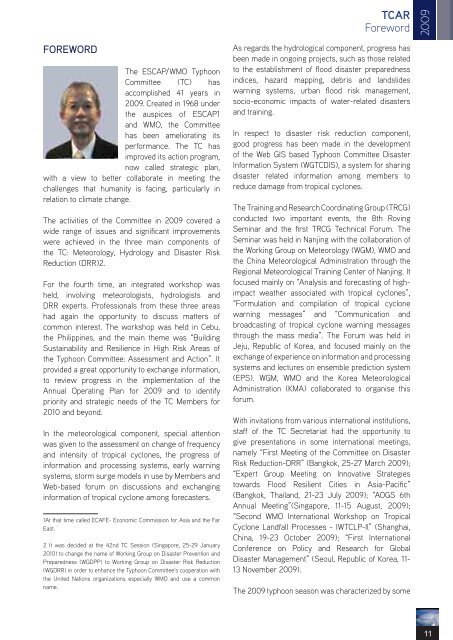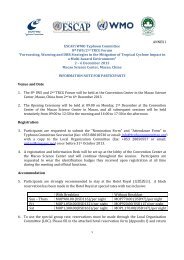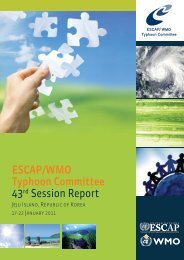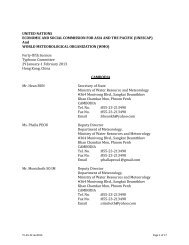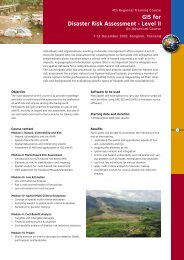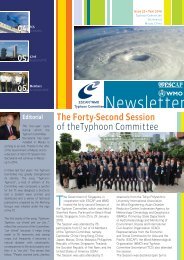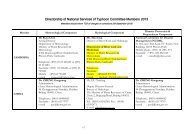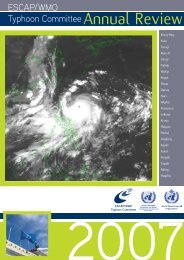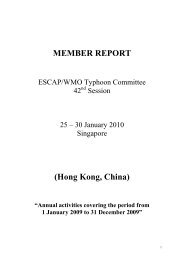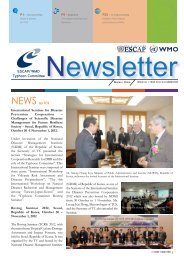TCAR - Typhoon Committee
TCAR - Typhoon Committee
TCAR - Typhoon Committee
You also want an ePaper? Increase the reach of your titles
YUMPU automatically turns print PDFs into web optimized ePapers that Google loves.
FOREWORD<br />
The ESCAP/WMO <strong>Typhoon</strong><br />
<strong>Committee</strong> (TC) has<br />
accomplished 41 years in<br />
2009. Created in 1968 under<br />
the auspices of ESCAP1<br />
and WMO, the <strong>Committee</strong><br />
has been ameliorating its<br />
performance. The TC has<br />
improved its action program,<br />
now called strategic plan,<br />
with a view to better collaborate in meeting the<br />
challenges that humanity is facing, particularly in<br />
relation to climate change.<br />
The activities of the <strong>Committee</strong> in 2009 covered a<br />
wide range of issues and significant improvements<br />
were achieved in the three main components of<br />
the TC: Meteorology, Hydrology and Disaster Risk<br />
Reduction (DRR)2.<br />
For the fourth time, an integrated workshop was<br />
held, involving meteorologists, hydrologists and<br />
DRR experts. Professionals from these three areas<br />
had again the opportunity to discuss matters of<br />
common interest. The workshop was held in Cebu,<br />
the Philippines, and the main theme was “Building<br />
Sustainability and Resilience in High Risk Areas of<br />
the <strong>Typhoon</strong> <strong>Committee</strong>: Assessment and Action”. It<br />
provided a great opportunity to exchange information,<br />
to review progress in the implementation of the<br />
Annual Operating Plan for 2009 and to identify<br />
priority and strategic needs of the TC Members for<br />
2010 and beyond.<br />
In the meteorological component, special attention<br />
was given to the assessment on change of frequency<br />
and intensity of tropical cyclones, the progress of<br />
information and processing systems, early warning<br />
systems, storm surge models in use by Members and<br />
Web-based forum on discussions and exchanging<br />
information of tropical cyclone among forecasters.<br />
1At that time called ECAFE- Economic Commission for Asia and the Far<br />
East.<br />
2 It was decided at the 42nd TC Session (Singapore, 25-29 January<br />
2010) to change the name of Working Group on Disaster Prevention and<br />
Preparedness (WGDPP) to Working Group on Disaster Risk Reduction<br />
(WGDRR) in order to enhance the <strong>Typhoon</strong> <strong>Committee</strong>’s cooperation with<br />
the United Nations organizations especially WMO and use a common<br />
name.<br />
<strong>TCAR</strong><br />
Foreword<br />
As regards the hydrological component, progress has<br />
been made in ongoing projects, such as those related<br />
to the establishment of flood disaster preparedness<br />
indices, hazard mapping, debris and landslides<br />
warning systems, urban flood risk management,<br />
socio-economic impacts of water-related disasters<br />
and training.<br />
In respect to disaster risk reduction component,<br />
good progress has been made in the development<br />
of the Web GIS based <strong>Typhoon</strong> <strong>Committee</strong> Disaster<br />
Information System (WGTCDIS), a system for sharing<br />
disaster related information among members to<br />
reduce damage from tropical cyclones.<br />
The Training and Research Coordinating Group (TRCG)<br />
conducted two important events, the 8th Roving<br />
Seminar and the first TRCG Technical Forum. The<br />
Seminar was held in Nanjing with the collaboration of<br />
the Working Group on Meteorology (WGM), WMO and<br />
the China Meteorological Administration through the<br />
Regional Meteorological Training Center of Nanjing. It<br />
focused mainly on “Analysis and forecasting of highimpact<br />
weather associated with tropical cyclones”,<br />
“Formulation and compilation of tropical cyclone<br />
warning messages” and “Communication and<br />
broadcasting of tropical cyclone warning messages<br />
through the mass media”. The Forum was held in<br />
Jeju, Republic of Korea, and focused mainly on the<br />
exchange of experience on information and processing<br />
systems and lectures on ensemble prediction system<br />
(EPS). WGM, WMO and the Korea Meteorological<br />
Administration (KMA) collaborated to organise this<br />
forum.<br />
With invitations from various international institutions,<br />
staff of the TC Secretariat had the opportunity to<br />
give presentations in some international meetings,<br />
namely “First Meeting of the <strong>Committee</strong> on Disaster<br />
Risk Reduction-DRR” (Bangkok, 25-27 March 2009);<br />
“Expert Group Meeting on Innovative Strategies<br />
towards Flood Resilient Cities in Asia-Pacific”<br />
(Bangkok, Thailand, 21-23 July 2009); “AOGS 6th<br />
Annual Meeting”(Singapore, 11-15 August, 2009);<br />
“Second WMO International Workshop on Tropical<br />
Cyclone Landfall Processes - IWTCLP-Il” (Shanghai,<br />
China, 19-23 October 2009); “First International<br />
Conference on Policy and Research for Global<br />
Disaster Management” (Seoul, Republic of Korea, 11-<br />
13 November 2009).<br />
The 2009 typhoon season was characterized by some<br />
2009<br />
11


